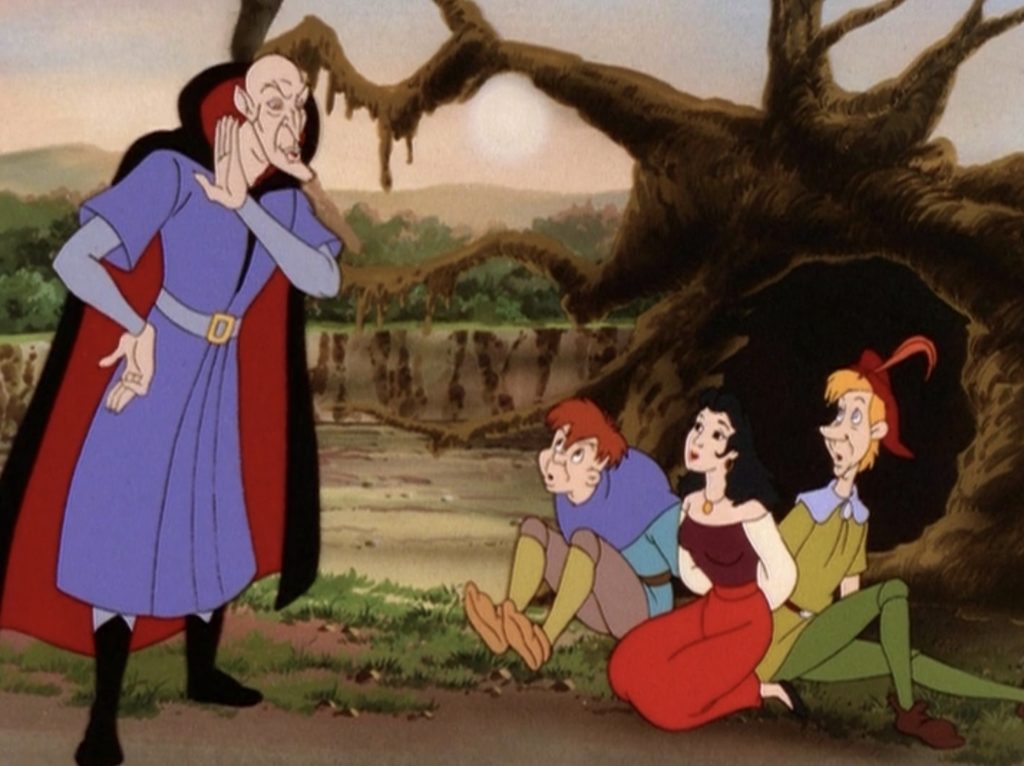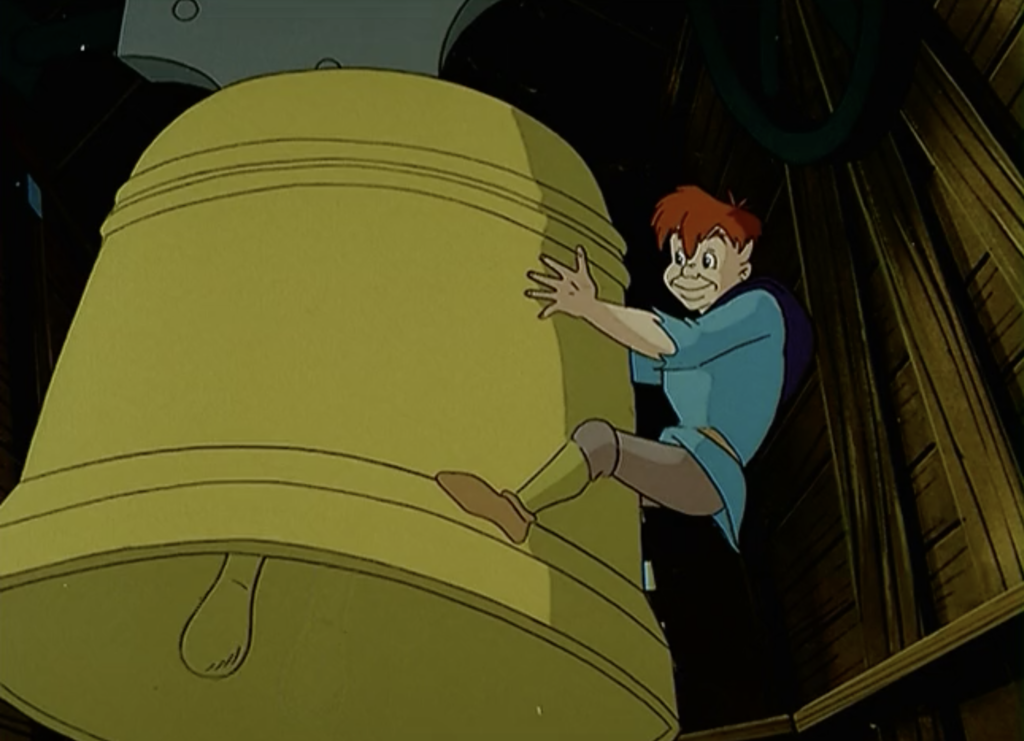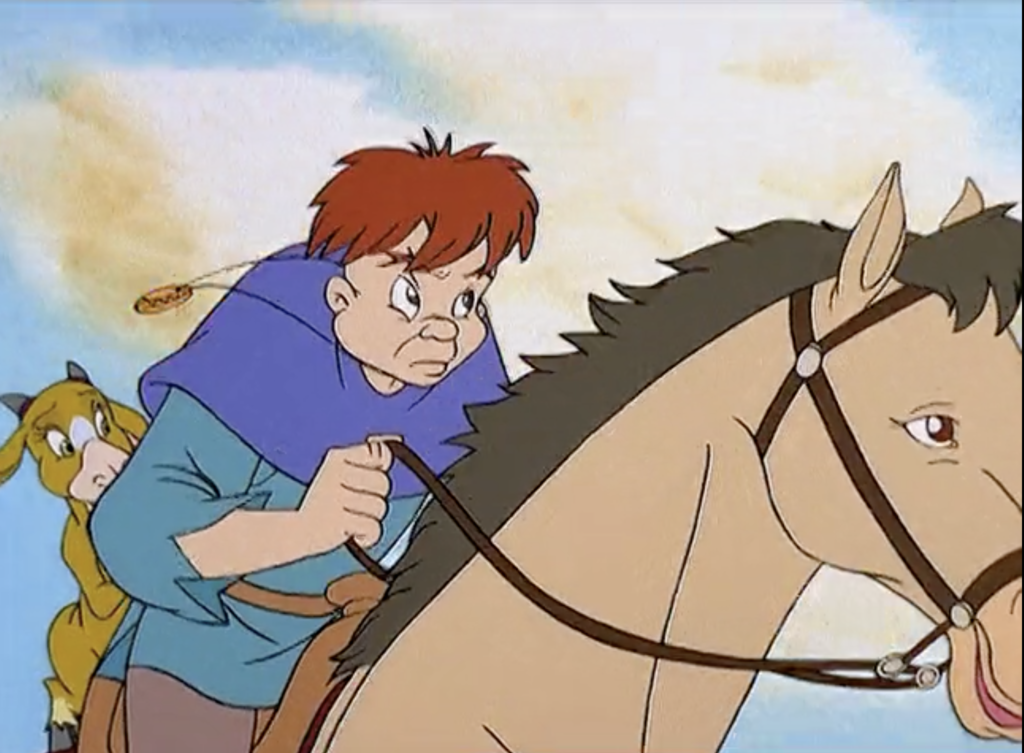When I first heard of The Magical of the Adventures of Quasimodo, I thought the usage of the word “magical” was metaphoric. Like the adventures were going to be “charming” or “delightful.” Maybe there is a touch of whimsy but it’s was grounded since the book is grounded and the concept of “magic” is tantamount to madness and injustice but no, that is not the case. There is magic in this show in multiple forms in most every episode. And that is just how it is.
Now this show came out right on the heels of the Disney’s Hunchback being released, about a month prior, so was this show in the works as fantasy show and got reworked to fit a Hunchback-esque theme in order to capitalize off of the Disney movie or did start off a knock-off and became something else or maybe it was a coincidence? I have no idea however because it’s a weird hybrid of fantasy that is inspired by Hugo’s novel this makes the show its own unique thing. It’s strange to be sure but it’s memorable and odd.
Mind you it is very flawed and for a very specific age and time period. Not that it’s not enjoyable in parts but it’s a product of its day and age. It’s very debatable whether this show is good or not.

So is there a plot and is the plot anything like the book? Kinda and no, not at all. The plot of the book does not feature in this version. There are shades of it but it’s manifests as being representational of the characters. Quasimodo is the bell-ringer at Notre Dame in Paris. He develops feelings for Esmeralda who is a nomad dancer & goat trainer. At the start Frollo and a Priest, Dennis, are Quasimodo’s care-takers. Frollo’s lust leads to him becoming a criminal but his lust is for power and wealth instead of a beautiful woman. The setting and time period reference the book but aside from Notre Dame acting more as a boarding school with an impressive library it functionally is not the same, it exists in name only.
So does this loose take on the novel have any plot? While the episodes are episodic there is a narrative through-line, a through-line that is muddle because the order of airing. Basically most episodes feature Frollo and magical shenanigans as he tries and fails to conquer the world or France or tries to gain wealth either through magic or alchemy, sometimes both. And kudos for this show going hard on the alchemy angle because it mentioned in the book but it’s a major facet here. Alchemy also factors into the plot because of the other through-line which is Quasimodo’s quest to find his parents.
In the second episode we learn of Quasimodo’s origins, that he is really the son of nobles who were alchemists who also supposedly died in a fire. This fire is what led to Quasimodo getting separated from his parents as a baby. From there he was left at Notre Dame by his nursemaid. Quasimodo’s birth name is Jacques. However it’s later revealed that they might be alive and are in hiding so Quasimodo sets out to learn more about them and maybe their location in hopes of reuniting with them because they are awesome.
However by the 12th episode Quasimodo learns that a couple matching his parents’ description is about to leave France for England. Quasimodo is forced to make a choice between his parents and Esmeralda and François who are in danger.
This feels more like a conclusion to his quest as it about Quasimodo’s wants vs needs. As a coming-age story this makes sense since Quasimodo wanted to reunite with his long-lost parents but he needs to be a grown up and saves his beloved friends. I think this was the production’s intent but due to the demographics skewing younger it was switched around since this narrative ending doesn’t work as well for younger children (6-8 year olds). It would work better for older children (10-12 year olds) but this show feels a little too young for that range. So whether the episode order was intentional or not there was still a hope for Quasimodo to reunite with parents again even though narratively with the episode order it doesn’t make sense.
However a plot through-line for a late 90s kids show was something that wasn’t often seen in Western cartoon productions. Typically plots in this style of show would be a two-episode arc or reoccurring characters or gags not a on-going quest or goal. So even the little it gives is commendable.
Again this show is hopelessly flawed and can be annoyingly juvenile but it did try to do its own thing and does have a unique charm.
Follow thehunchblog

